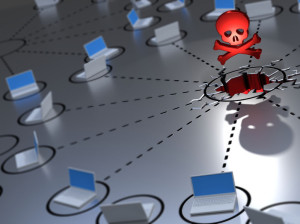Four simple tips for reducing the risk of a cyberattack
 As a construction professional, you probably don’t spend much time thinking about cybersecurity. Most of your work takes place outdoors without an internet connection, but that’s starting to change. Thanks to the Internet of things and the increasing popularity of “smart” tools, a strong (and secure) wi-fi connection is becoming a must.
As a construction professional, you probably don’t spend much time thinking about cybersecurity. Most of your work takes place outdoors without an internet connection, but that’s starting to change. Thanks to the Internet of things and the increasing popularity of “smart” tools, a strong (and secure) wi-fi connection is becoming a must.
Still not convinced? Then consider this: a recent survey conducted by Forrester found that 75% of respondents in the construction, infrastructure and engineering industries experienced a cyber incident during the last 12 months. Even a minor breach could expose valuable information, including your clientele’s data. Instead of waiting for a breach to occur (and eventually, it will), take preventive action now. Here are a handful of tips to help you get started.
1.) Teach your team members good cybersecurity practices. Did you know that 88% of security breaches are a result of human error? If you aren’t familiar with phishing, malware or ransomware scams, it’s easy to fall victim. Throughout the year, you routinely host safety trainings, so why not incorporate some cybersecurity lessons as well? This guide on phishing from the Federal Trade Commission is a great place to start.
2.) Keep software and applications updated. If you regularly ignore software updates, it’s only a matter of time before a security breach occurs. Even well-known software developers like Apple and Google make coding mistakes and release patches to correct them. As a general rule, back up all of your company data at least once a week. Whenever your laptop or desktop says a new software update is available, download it immediately. This admittedly takes a bit of time, but it’s absolutely worth the effort.
3.) Appropriately dispose of computers and hard drives. If you’ve recently updated all of the computers at your office, it can be tempting to toss the old ones out, but that’s a major security no-no. Someone with the expertise and know-how could easily collect these items from a landfill and access valuable information stored on the hard drives. Take the time to wipe each piece of equipment thoroughly. If you’re unsure where to begin, check out this guide from Popular Mechanics.
4.) Invest in a cybersecurity checkup. Just as you change out the batteries in your smoke alarms and carbon monoxide detectors, it’s important to invest in routine cybersecurity checkups. Even if you follow all of the recommendations on this list, it’s possible to make mistakes. Reevaluating your current plan once every 12 months and making updates or changes as necessary can provide you peace of mind and protect your most valuable assets.
How do you protect your firm from cyberattacks? If you have any recommendations that aren’t in this blog, visit our Facebook page and leave a comment. We look forward to hearing your thoughts.








